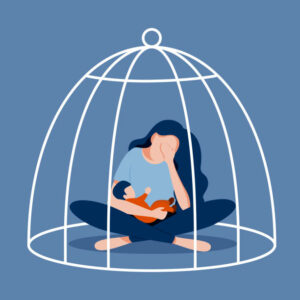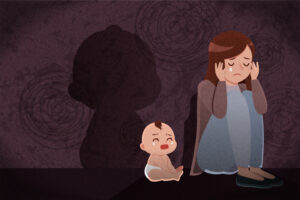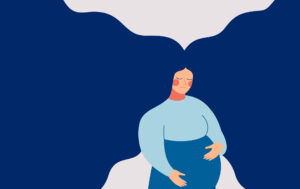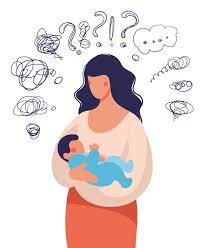It’s normal to feel anxious after giving birth. A little bit of anxiety can be a good thing, as it can help you focus on taking care of your baby. However, for some women, post-birth anxiety becomes a problem. This is known as postnatal OCD or postpartum obsessive-compulsive disorder. If you are experiencing symptoms of OCD after giving birth, it’s important to get help. In this blog post, we will discuss the signs and symptoms of postnatal OCD, as well as ways to get treatment.
Contents
What Is Postnatal OCD?

Postnatal OCD is a form of OCD that can develop after you have a baby. It is characterized by obsessive thoughts and fears about your baby’s health and well-being. You may worry that you are not doing enough to care for your baby, or that something will happen to them. These obsessions can lead to compulsions, such as checking on your baby constantly or washing your hands over and over again. Women with postpartum OCD are aware of their intrusive thoughts but they cannot control them. Instead, the thoughts cause counteractive behaviors which affect the mother’s mental health and also harm the quality of the mother-baby relationship. Postnatal OCD can be a very debilitating condition, but it is treatable.
Causes Of Postnatal OCD

The exact cause of postnatal OCD is unknown. However, some risk factors may increase your chances of developing the condition. These include:
- A history of OCD or another mental health disorder
- Stressful life events during pregnancy or after giving birth
- Lack of support from family and friends
- Past trauma surrounding pregnancy (example: abortions, miscarriages, stillbirths)
- Some complications during the pregnancy/birthing process
- Medication/psychiatric drug reaction
- Sleep deprivation
Symptoms of Postnatal OCD
The symptoms of postnatal OCD can vary from woman to woman. However, there are some common signs and symptoms to look out for. If you are experiencing any of the following, it’s important to talk to your doctor or a mental health professional:
- Excessive worry about your baby’s health and safety
- Obsessive thoughts about something happening to your baby
- Compulsions such as checking on your baby constantly, or washing your hands over and over again
- Worry that you are not doing enough to care for your baby
- Unwanted intrusive thoughts about harming your baby
- Avoidance of activities or places that you associate with your baby
- Fearing that the baby might develop a serious disease
- Inability to make decisions for the baby’s development
- Difficulty in forming an emotional bond with the baby
- Troubles while breastfeeding
- Recurring and disturbing images of the baby’s dead body
- Intrusive thoughts or images about harm coming to your baby
- Feeling like you’re not doing enough for your baby
Compulsions

As with any form of OCD, compulsions are often a way to try and ease the anxiety caused by the obsessions. In postnatal OCD, common compulsions include:
- Checking on the baby constantly
- Washing your hands over and over again
- Not using sharp
- Avoiding activities or places that you associate with your baby
- Cleaning excessively
- Refraining from feeding the baby out of the fear of poisoning it
- Praying or making deals with God
- Needing reassurance from others about your baby’s health
Treatment for Postnatal OCD
If you are suffering from postnatal OCD, it’s important to get help. several there are several treatment options available, and your doctor can help you find the right one for you.
Treatment
Cognitive-behavioral therapy (CBT) is a type of therapy that can be effective in treating OCD. CBT helps you to change the way you think about your obsessions and compulsions and teaches you how to manage them healthily.
Exposure and response prevention (ERP) is another type of therapy that can be used to treat OCD. ERP involves gradually exposing yourself to the things that trigger your OCD symptoms and learning how to control your urge to perform compulsions.
Medication can also be used to treat OCD. Commonly prescribed medications include antidepressants, anti-anxiety drugs, and antipsychotics.
Self Help Tips
- Lean on your partner, family, or additional staff for taking care of the newborn baby.
- Take a healthy well-balanced and nutritious diet
- Avoid using drugs or alcohol as coping mechanisms
- Do not indulge in harsh criticism or self-depreciation for facing hardships. Motherhood is overwhelming and takes time to adjust.
- Practice patient and grateful forms of self-care and mindfulness.
If you are struggling with postnatal OCD, it’s important to seek help from a professional. With treatment, you can learn how to manage your symptoms and live a healthy and happy life with your new baby.
Conclusion
Postnatal OCD is a serious condition that can have a major impact on your life. If you think you might be suffering from postnatal OCD, it’s important to seek help. There are treatment options available, and with the right support, you can recover.
If you are looking for affordable Online OCD Counseling MantraCare can help: Book a trial OCD therapy session


